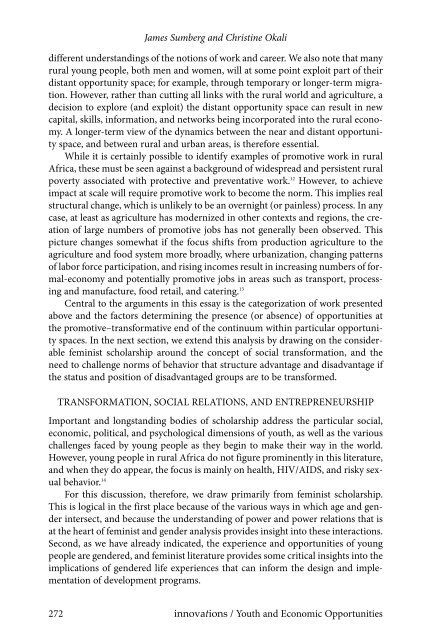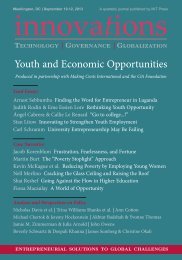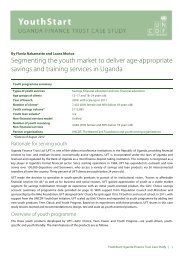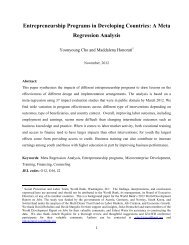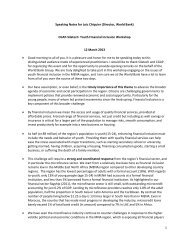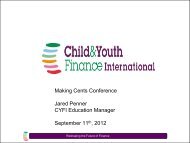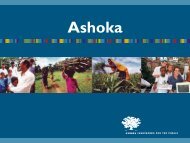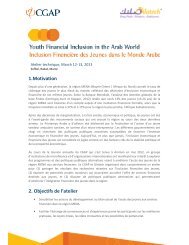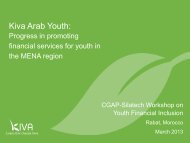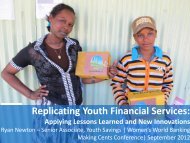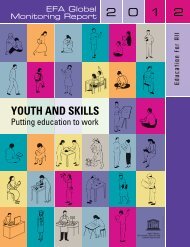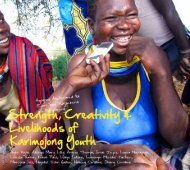James Sumberg and Christine Okalidifferent understandings of the notions of work and career. We also note that manyrural young people, both men and women, will at some point exploit part of theirdistant opportunity space; for example, through temporary or longer-term migration.However, rather than cutting all links with the rural world and agriculture, adecision to explore (and exploit) the distant opportunity space can result in newcapital, skills, information, and networks being incorporated into the rural economy.A longer-term view of the dynamics between the near and distant opportunityspace, and between rural and urban areas, is therefore essential.While it is certainly possible to identify examples of promotive work in ruralAfrica, these must be seen against a background of widespread and persistent ruralpoverty associated with protective and preventative work. 12 However, to achieveimpact at scale will require promotive work to become the norm. This implies realstructural change, which is unlikely to be an overnight (or painless) process. In anycase, at least as agriculture has modernized in other contexts and regions, the creationof large numbers of promotive jobs has not generally been observed. Thispicture changes somewhat if the focus shifts from production agriculture to theagriculture and food system more broadly, where urbanization, changing patternsof labor force participation, and rising incomes result in increasing numbers of formal-economyand potentially promotive jobs in areas such as transport, processingand manufacture, food retail, and catering. 13Central to the arguments in this essay is the categorization of work presentedabove and the factors determining the presence (or absence) of opportunities atthe promotive–transformative end of the continuum within particular opportunityspaces. In the next section, we extend this analysis by drawing on the considerablefeminist scholarship around the concept of social transformation, and theneed to challenge norms of behavior that structure advantage and disadvantage ifthe status and position of disadvantaged groups are to be transformed.TRANSFORMATION, SOCIAL RELATIONS, AND ENTREPRENEURSHIPImportant and longstanding bodies of scholarship address the particular social,economic, political, and psychological dimensions of youth, as well as the variouschallenges faced by young people as they begin to make their way in the world.However, young people in rural Africa do not figure prominently in this literature,and when they do appear, the focus is mainly on health, HIV/AIDS, and risky sexualbehavior. 14For this discussion, therefore, we draw primarily from feminist scholarship.This is logical in the first place because of the various ways in which age and genderintersect, and because the understanding of power and power relations that isat the heart of feminist and gender analysis provides insight into these interactions.Second, as we have already indicated, the experience and opportunities of youngpeople are gendered, and feminist literature provides some critical insights into theimplications of gendered life experiences that can inform the design and implementationof development programs.272 innovations / <strong>Youth</strong> and <strong>Economic</strong> <strong>Opportunities</strong>
Young People, Agriculture, and Transformation in Rural AfricaBut we need to focus first on the link between development and transformation,particularly as we start with the conception of development that has povertyalleviation and social justice at its core. Feminist scholars and activists use the term“transformation” to refer to a change in the status and position of women(described as subordinate) relative to men. Transformation comes about throughindividual but especially through collective action that challenges entrenchedinstitutions and power relations. Women’s agency is placed at center stage, but it isrecognized that their ability to act may be limited. In relation to work, the focus ison the relative terms and conditions of employment for men and women, but morebroadly on the relative value attributed to work done by men and women in all sectorsand domains, including unpaid domestic work. In this context, transformativework is as much about being in a position to exercise choice as about the work perse, and the struggle is against women’s “constrained inclusion” and “adverse incorporation”into labor markets. 15This understanding of transformation contrasts with the narrower notion ofwomen’s economic empowerment that is common currency in much developmentpractice. Here the emphasis is on individual women having control of their assetsand income; as such, economic empowerment is presented as individual self-fulfilment,with clear ownership rights incentivizing individual as opposed to collectiveaction. The anticipated economic and social impact of this model of empowerment—includingexpectations that women will forgo their own needs and interestsin favor of their children and household—are then used to justify state anddevelopment agency investment that promotes women’s economic activities. Afocus on women’s empowerment thus becomes “smart economics.” 16The major limitation in this conception of economic empowerment is the factthat men and women exist and act within a network of social relations, and, moreover,that to some extent these social relations (with spouses, siblings, parents,friends, kin group members, etc.) both enable and constrain action. Decisions areseldom taken or implemented by men or women in isolation, with no reference tojoint interests and projects or to the interests and projects of others. Thus, a simplisticconception of individual decisionmaking and individual action can be dangerouslymisleading.We find these contrasting views of transformation and social relations usefulbecause young people, whether male or female, also depend on support from others—ontheir social relations and networks—as they start to explore the localopportunity space, enter the world of work, and begin to build their livelihoods.Assistance comes in many forms, and parents and/or the domestic unit is rarely itsonly source. For example, our work with young, male, cash-oriented tomato growersin Ghana demonstrated clearly that the success of their activities depended onsisters, mothers, or aunts preparing their daily food; on family or others providing(through rental arrangements or otherwise) access to scarce riverside land; and onworking together with friends on one another’s plots at peak times. These youngmen were anything but atomized, isolated, or individualized economic actors. Onthe other hand, the fact that in many cases they were not encumbered by otherinnovations / 2013 Global <strong>Youth</strong> <strong>Economic</strong> <strong>Opportunities</strong> Conference 273
- Page 1 and 2: Washington, DC | September 10-12, 2
- Page 3 and 4: Hathay Bunano77 Reducing Poverty by
- Page 5 and 6: Making Cents International andCiti
- Page 7 and 8: Making Cents International andCiti
- Page 9 and 10: James Sumberg and Christine OkaliYo
- Page 11 and 12: Young People, Agriculture, and Tran
- Page 13: Young People, Agriculture, and Tran
- Page 17 and 18: Young People, Agriculture, and Tran
- Page 19 and 20: Young People, Agriculture, and Tran


